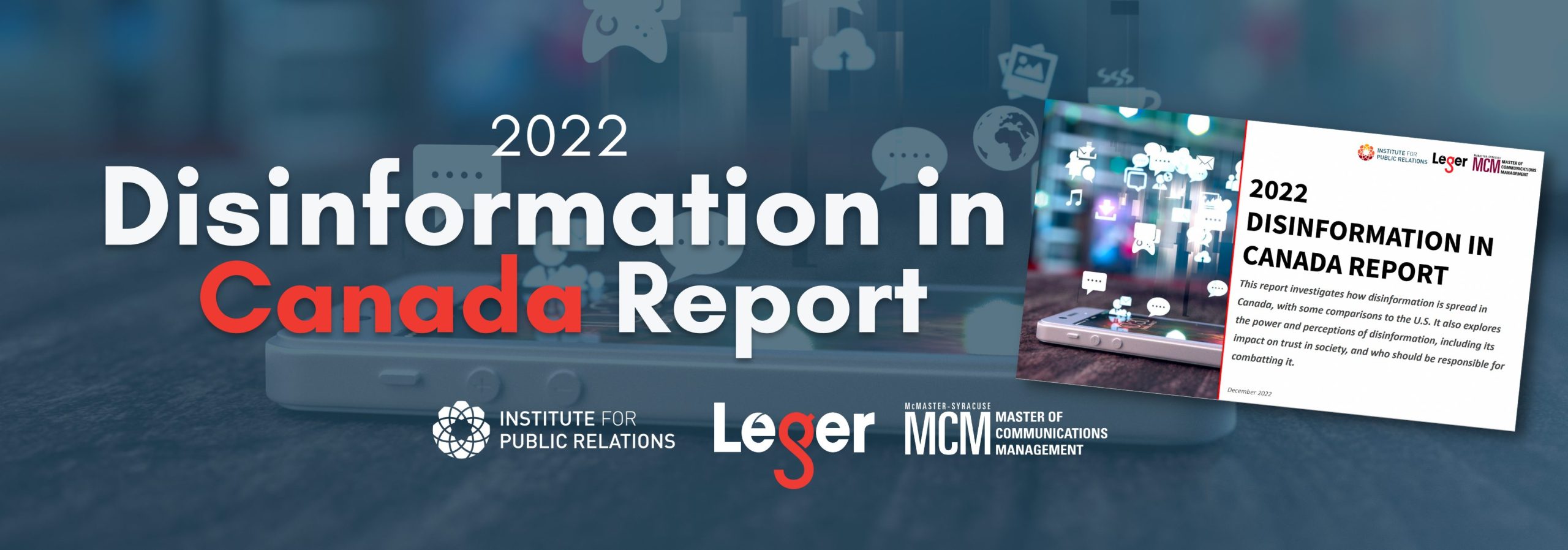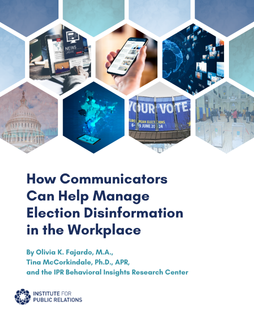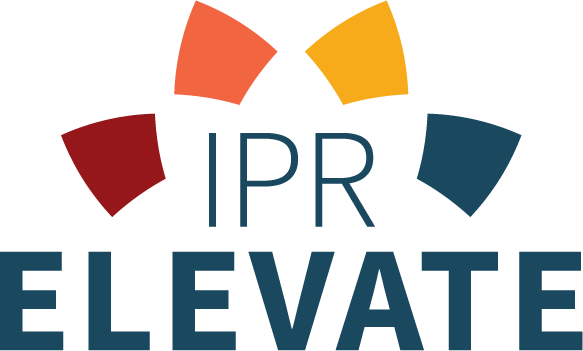The 2022 Disinformation in Canada Report surveyed 2,003 Canadians to determine the perceived societal impact of disinformation
Dec. 7, 2022 – Toronto, Canada— Nearly three-quarters (72%) of Canadians believe that disinformation, or deliberately false misleading news or information, threatens Canadian democracy, according to a new report by Leger, the Institute for Public Relations (IPR), and McMaster University. Additionally, more than half (51%) said disinformation is a major problem in society and 71% said it undermines election processes. The survey of 2,003 Canadians, with questions based on the 2022 IPR Disinformation in Society Report, was conducted May 12 – 22, 2022, to explore the prevalence and effects of disinformation, source trustworthiness, and the sources responsible for spreading and combatting disinformation.
“Previous IPR studies demonstrate disinformation as an increasingly significant problem in the U.S. and our study showed some concerning numbers in Canada,” said David Scholz, APR, EVP & partner at Leger. “Who Canadians trust and distrust is critical knowledge to determining the right medium for our communications. Although, even with the right medium, we are losing contact with Canadians, as 40% of Canadians say that encountering disinformation makes them feel anxious or stressed and 28% of Canadians avoid media because of it.”
Some key findings include:
Canadian broadcast news outlets are well-trusted but journalists slightly less so. Canadian broadcaster CBC is ranked highly by 68% of Canadians in terms of trustworthiness and a source that combats disinformation well. Fifty-eight percent of Canadians rated journalists as at least “somewhat” trustworthy.
Personal connections are the most trusted sources for information. Personal connections such as family (75%), “people like me” (74%) and friends (71%) come out on top when it comes to trusted sources for news/information.
One-in-five Canadians do not feel responsible for combatting disinformation. Only 23% of Canadians felt personally responsible for combatting disinformation while that percentage jumped to 31% for those under 35.
Canadians believe disinformation has prolonged the COVID-19 pandemic. Two-thirds of Canadians (66%) feel that disinformation will prolong the pandemic. Seventy-two percent believe there is a lot of disinformation about the COVID-19 vaccine.
A significant gap exists between the sources who should be responsible for combatting disinformation versus how well they are actually combatting it. With nearly all sources, those that were deemed to be most responsible for combatting disinformation were not rated as highly in how well they were combatting it. For example, more than 8-out-of-10 said their provincial government (83%) and journalists (83%) should be responsible for combatting disinformation while fewer than 4-out-of-10 said their provincial government (38%) and journalists (36%) said were combatting it at least “somewhat well.”
“Compared to the IPR study in the U.S., disinformation is seen as significantly larger problem in Canada,” said Tina McCorkindale, Ph.D., APR, president and CEO of the Institute for Public Relations. “Also, the U.S. sees wider gaps of the trustworthiness of mainstream media sources than Canada. The U.S. does not have a single mainstream media source that political parties agree upon like Canada does even though local broadcast and print news are trusted in both countries.”
According to Dr. Terry Flynn, associate professor of communication studies and graduate director of the Master of Communications Studies program at McMaster University, “this study reaffirms the importance of credible media outlets as trusted sources to combat disinformation. Canadians have strong confidence in both national and local news.”
For all key findings and a detailed analysis, please download the full report, here.
Methodology: Leger conducted a survey of 2,003 Canadians between May 12 and May 22, 2022, using Leger’s online panel. The U.S. data included within this report comes from the Institute for Public Relations 2022 Disinformation in Society Report. Leger’s online panel has approximately 400,000 members nationally and has a retention rate of 90%. Poll aggregator 338Canada.com gave Leger the highest rating among all polling firms in Canada for the accuracy of its studies. (See https://338canada.com/pollster-ratings.htm.)
###
Media Contact:
Brittany Higginbotham
Communications Associate
brittany@instituteforpr.org
352-615-8211
About the Institute for Public Relations
Founded in 1956, the Institute for Public Relations is an independent, nonprofit foundation dedicated to the science beneath the art of public relations™. IPR creates, curates, and promotes research and initiatives that empower professionals with actionable insights and intelligence they can put to immediate use. IPR predicts and analyzes global factors transforming the profession and amplifies and engages the profession globally through thought leadership and programming. All research is available free at www.instituteforpr.org and provides the basis for IPR’s professional conferences and events.
About Leger
Leger is the largest Canadian-owned market research and analytics company, with more than 600 employees in eight Canadian and US offices. Leger has been working with prestigious clients since 1986. Leger’s online panel has approximately 400,000 members nationally and has a retention rate of 90%. Poll aggregator 338Canada.com gave Leger the highest rating among all polling firms in Canada for the accuracy of its studies.
About McMaster University Master of Communication Management Program
The MCM program is Canada’s leading master’s degree for professional communicators, creative professionals, executives, entrepreneurs and researchers in the many fields related to communications management: marketing, fund-raising, digital and social media, public affairs, investor relations, and many others. The part-time program has been designed for working professionals who have active professional and personal lives. The MCM faculty and administrators understand your many commitments and are flexible to enable you to work, live and study in harmony. Established in 2007, the program currently has more than 200 alumni and students from across Canada and increasingly from around the world. For more information on the program, admission requirements and course descriptions please visit us at https://mcm.humanities.mcmaster.ca/.




